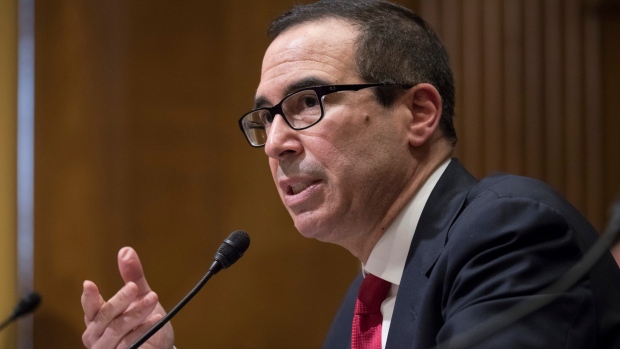Feb 13, 2017
Steven Mnuchin confirmed as Treasury secretary by U.S. Senate
, Reuters

The U.S. Senate voted to confirm former banker and Hollywood financier Steven Mnuchin as Treasury secretary on Monday, installing the Trump administration's point-man on tax reform, financial de-regulation and economic diplomacy efforts.
The Senate voted 53-47 to confirm the Goldman Sachs veteran's nomination on a mostly party-line vote, with only one Democrat, Senator Joe Manchin of West Virginia, voting in favour.
Mnuchin was expected to be sworn into office on Monday night in a brief White House ceremony, putting a Wall Street veteran in charge of the Treasury for the first time in eight years, after the financial crisis pushed top U.S. bankers out of favour.
Lawmakers, lobbyists and business groups have been waiting for Mnuchin to fill in the many blanks on how he will pursue tax reform and handle delicate economic cooperation efforts with China, Mexico and other trading partners worried about President Donald Trump's "America First" trade strategy.
Mnuchin faces immediate challenges with the March 15 expiration of a U.S. debt ceiling suspension, ushering in the threat of a new default showdown, and a March 17 meeting of finance ministers from the Group of 20 major economies, where he will face tough questions about Trump's plans to increase trade protections.
"There is a real open question as to whether this administration is going to cut itself off from international monetary cooperation, whether it's exchange rate policies or attitudes towards multilateral institutions or international regulatory policy," said Edwin Truman, a former Treasury and Federal Reserve official now with the Peterson Institute for International Economics
Truman said Mnuchin's hardest job would be managing a sprawling tax reform effort with Congress that seeks to slash business tax rates and enact a new border tax adjustment system aimed at boosting U.S. exports. He noted that was a longer-term project.
Mnuchin, 54, will quickly need to build a core management team to handle such challenges.
Treasury and White House representatives did not respond to requests for comment on Monday on reports that Trump would soon nominate David Malpass, a former economist at failed Wall Street bank Bear Stearns, as Treasury undersecretary for international affairs, the agency's top economic diplomacy job.
Malpass, a Trump campaign adviser who had been leading Treasury transition efforts, was seen as a leading candidate for the job, with experience from international economic posts in the Ronald Reagan and George H.W. Bush administrations.
Other names that have been floated for senior posts include Goldman Sachs banker Jim Donovan for deputy Treasury secretary and Justin Muzinich, a former Morgan Stanley banker, for undersecretary of domestic finance.
The Senate on Monday also unanimously confirmed David Shulkin as secretary of veterans affairs, putting the only holdover from the Obama administration in charge of the second largest federal agency. Shulkin had been in charge of the VA's sprawling health system for the past 18 months.
Mnuchin, a second-generation Goldman Sachs banker who led the firm's mortgage bond trading but left the bank in 2002, has come under fire over his investor group's 2009 acquisition of another failed lender, IndyMac Bank, in a deal in which the Federal Deposit Insurance Corp agreed to absorb most of the losses on IndyMac foreclosures.
The bank, rebranded as OneWest, subsequently foreclosed on more than 36,000 homeowners, drawing charges from Democrats and housing advocates that it was a "foreclosure machine."
Mnuchin grew OneWest into Southern California's largest lender and sold it for US$3.4 billion in 2015. He has also helped finance Hollywood blockbusters such as "Avatar," "American Sniper" and this past weekend's box office champion, "The Lego Batman Movie," which took in US$55.6 million.
